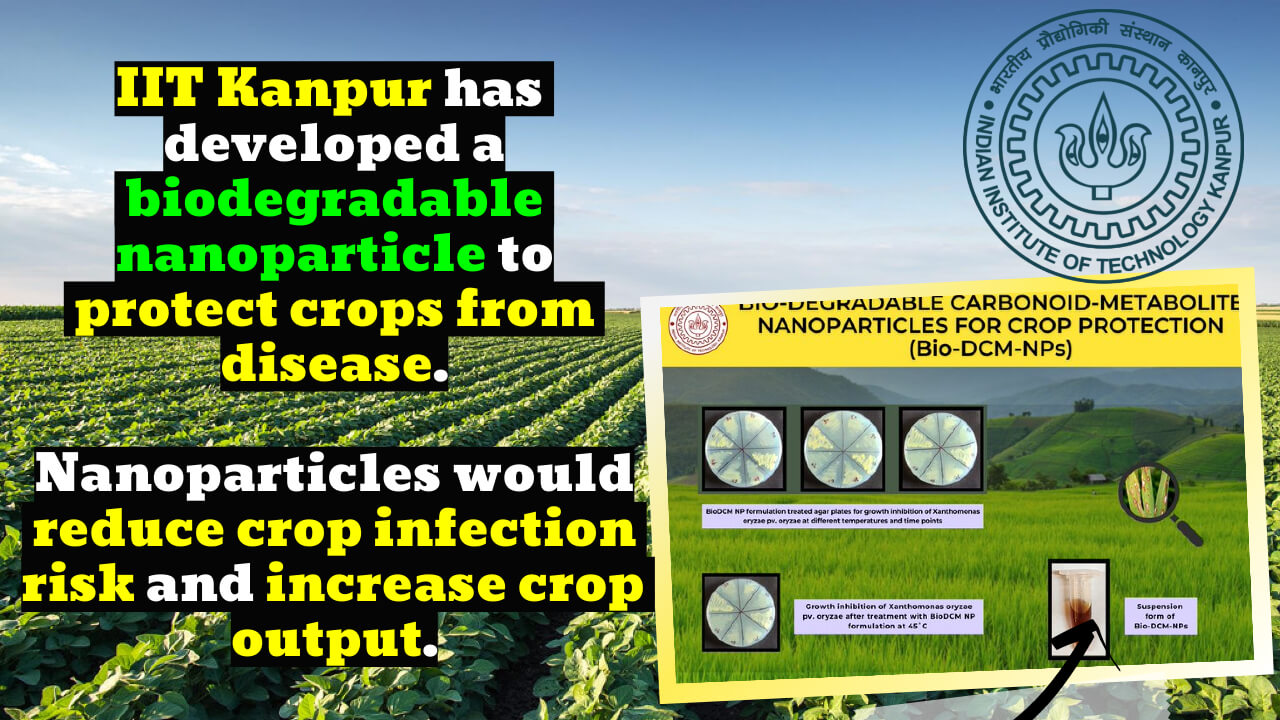IIT Kanpur researchers have discovered a biodegradable nanoparticle that can be used as an alternative to chemical-based insecticides in the field of agriculture. Farmers can use nanoparticles to help protect their crops from bacterial and fungal infestations by spraying them on the plants. They are non-toxic and have no negative impact on the soil or the health of those who consume them.
Key Highlight:
- Farmers can protect their crops from bacterial and fungal infections by using a biodegradable nanoparticle developed by researchers at the Indian Institute of Technology (IIT) Kanpur. The nanoparticle can be used as an alternative to chemical-based pesticides and help farmers protect their crops from bacteria and fungal infections.
- The nanoparticle, which has been named Biodegradable Carbonoid Metabolite (BioDCM), can remain active at low concentrations and can be as effective as pesticides while having no harmful effects on soil or consumer health.
- According to the Indian Institute of Technology Kanpur, it operates quickly since it is applied in bioactive form and can resist high temperatures.
- Nanoparticles would alleviate the fear of crop contamination while also increasing agricultural production.
- IIT Kanpur has created several ways to increase agricultural yields while addressing several issues plaguing Indian agriculture.
Farmers can protect their crops from bacterial and fungal infections by using a biodegradable nanoparticle developed by researchers at the Indian Institute of Technology (IIT) Kanpur. The nanoparticle can be used as an alternative to chemical-based pesticides and help farmers protect their crops from bacteria and fungal infections.
The nanoparticle, which has been named Biodegradable Carbonoid Metabolite (BioDCM), can remain active at low concentrations and can be as effective as pesticides while having no harmful effects on soil or consumer health. According to the Indian Institute of Technology Kanpur, it operates quickly since it is applied in bioactive form and can resist high temperatures.
C. Kannan and Divya Mishra from the ICAR-Indian Institute of Rice Research and researchers R. Balamurugan and Mou Mandal from the School of Chemistry at the University of Hyderabad have collaborated on the development of the nanoparticle, which IIT Kanpur announced.
Abhay Karandikar, Director of the Indian Institute of Technology Kanpur, pointed out that “since the issues faced by farmers are numerous, our efforts have been unrelenting to improve the entire farming environment.”
“Nanoparticles would alleviate the fear of crop illness while simultaneously increasing agricultural productivity.”
According to a report released in June 2021 by the United Nations Food and Agriculture Organization (FAO), farmers worldwide lose up to 40% of their crops to insects and illnesses each year, resulting in an estimated $290 billion loss to the global economy.
IIT Kanpur has created several ways to increase agricultural yields while addressing several issues plaguing Indian agriculture. A soil testing gadget called Bhu Parikshak, developed by the institute in December 2021, can measure soil health in 90 seconds and can be used to identify soil health problems. It was created to alleviate the time-consuming getting solid health tested through laboratories. Farmers are frequently required to wait several days for results from laboratories.
Natural products are becoming increasingly popular in organic farming and exported items. Because of the biodegradable and non-harmful character of the nanoparticles developed by IIT Kanpur, it is believed that they will attract a great deal of interest from farmers who wish to reduce the use of chemicals in agriculture particularly pesticides.
What is the word meaning biodegradable?
Biodegradable is a material that is both degradable and that breaks down completely under the action of living organisms or sunlight. Usually, it is either partly or completely broken down within a certain time period.
Biodegradable is an adjective used to describe a substance or product that breaks down into compounds that are readily broken down by living organisms. Biodegradable substances include paper, plastics, and certain proteins, as well as agricultural and urban wastes.
A Novel Nanoparticle-based Bio-Degradable Carbonoid-Metabolite (Bio-DCM-NPs)) has been developed by Dr Santosh K Misra & Mr Piyush Kumar of the Dept. of Biological Sciences & Bioengineering at @IITKanpur pic.twitter.com/ne7hIlhWHu
— Abhay Karandikar (@karandi65) February 25, 2022





[…] Biodegradable nanoparticles developed by the IIT Kanpur protect crops from disease […]